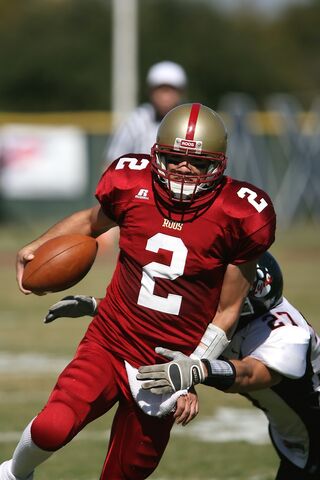Sport and Competition
Why Colleges Should Support Student Athlete Autonomy
Insights about the purpose and promise of college, and identity development.
Posted July 3, 2021 Reviewed by Vanessa Lancaster
Key points
- As students enter higher education to uncover and develop identity, the NCAA simultaneously claims ownership of their identity as an athlete.
- Black student-athletes are 5% less likely to graduate compared with other Black students.
- The focus should be on knowledge acquisition and healthy habits that put them on a path to sustainable well-being.

An astounding 56% of adults polled in the United States claim to be college sports fans. You might be one of 47 million fans who attend college football games or one of 163 million who watch games on television. A vast audience that fuels a colossal money-making machine.
Perhaps you spent $30 for a University of Alabama football jersey with your favorite 20-year-old player’s number on the back. If so, you contributed to the 4.5 billion dollars in annual college merchandise revenue. Weirdly, the National Collegiate Athletic Association (NCAA) has an iron-clad regulation about students earning a percentage of these profits,
“The student-athlete's compensation does not include any remuneration for value or utility that the student-athlete may have for the employer because of the publicity, reputation, fame or personal following that he or she has obtained because of athletics ability.”
If a college sells thousands of jerseys with a player’s number, the only person who cannot earn money on the deal is the player themselves. The same goes for when a player’s likeness is used in video games or commercials. When someone’s paycheck depends on the outcome, expect a great deal of resistance to change.
If this sounds problematic, you might feel hopeful that after 150 years of orthodox thinking, there is traction in fixing a dysfunctional system: state laws are being considered where students can capitalize on their fame. The Supreme Court decided that The NCAA cannot bar colleges from providing students with education-related perks such as computers and paid internships. And as of this writing, the NCAA relented. Missing from this contentious national debate are psychological insights about what college is for, what colleges promise, and identity development.
Higher Education Should Support Instead of Restrict Autonomy
Young adults who enter college are still discovering who they are, what they strive for, and who they want to become. Their identity is a work in progress. Many are living away from home for the first time. They meet people with a variety of demographics, viewpoints, and histories. They are exposed to perspectives unlike anything previously experienced. This is often jarring, uncomfortable, and challenging. During collegiate years, students forge a better understanding of their preferences, interests, and aspirations.
Until the age of 25, people’s prefrontal cortex is still developing, which is the seat of judgment, decision-making, and self-control. Their personality is not set in stone, it is malleable, and collegiate experience serves as an intervention. Formal education has been found to increase people’s intelligence reliably. Novel intellectual and social experiences, and the overcoming of adversity, serve as interventions to build character. All of which brings us to perhaps the most unsatisfying part about the NCAA’s rules for student-athletes.
As students enter higher education to uncover and develop their identity, the NCAA simultaneously claims ownership of their identity as an athlete. The NCAA lays claim to their name, their likeness, their entrepreneurship, and self-explorations.
“You are not eligible in any sport if, because of your athletic ability, you were paid for work you did perform…for the value an employer placed on your reputation, fame or personal following.”
Essentially, higher education decided that while students might produce great work and amass a great reputation, these assets are for the university.
Contending With Class and Race Issues
It is unsettling to think that as a student-athlete, you are partially the property of the NCAA. We are rubbing close to exploitation, where someone uses “another person’s vulnerability for one’s own benefit.” Class and race are unavoidable features of this conversation. College graduation rates of Black student-athletes are 14.3% lower than student-athletes of other racial groups. Across 65 universities, Black student-athletes are 5% less likely to graduate compared with other Black students. These data offer a startling contrast to critics that student-athletes are pampered with their free academic opportunities and mentorship toward a successful life.
What do students fall back on when their athletic talents fail to pay off, and their intellectual promise is never fulfilled? Professional teams draft less than 2% of men’s college football and basketball players. The opportunities for athletics are even fewer for members of the rowing, fencing, and track and field teams. A vast time commitment is spent practicing and training, dealing with physical exhaustion, and the rehabilitation of injuries. An intense athletic schedule leaves little time to develop the knowledge to succeed in life and work (not just sports).
Sports marketers, lobbyists, recruiters, and a host of other careers exist because large swaths of money are being made off the bodies of student-athletes. A multi-billion dollar industry exists, and these students serve one to four years before being swapped out for new bodies. Which begs the question — why can athletic coaches, staff, administrators, and the university profit off a student’s likeness during their short playing span while students cannot?
Fixing Dysfunctions
Students are not expendable commodities. They are the future. Our role in the educational system is to support them while uncovering, developing, and aiming their strengths. The focus should be on knowledge acquisition and healthy habits that put them on a path to sustainable well-being. We must protect time for academics, despite the pressure to work harder and longer in the athletic domain where they receive the greatest accolades. We must offer security in case of injury or social-emotional difficulties. We must foremost be a mentor and only secondarily view them as an athlete who aids the team and campus. We must prioritize the development and ownership of a healthy identity.
Too much revenue perverts the enterprise of education, especially when those in charge of student welfare profit the most from labor. Let’s bring in student-centric watchdogs immune to this financial windfall. Watchdogs who acknowledge the athletic demands and pressures, ensuring every student is treated as a scholar in the making rather than a few years of athletic talent to be tapped. Watchdogs who look out for the well-being of students away from home. Offering anything less is an abrogation of higher education responsibility.




